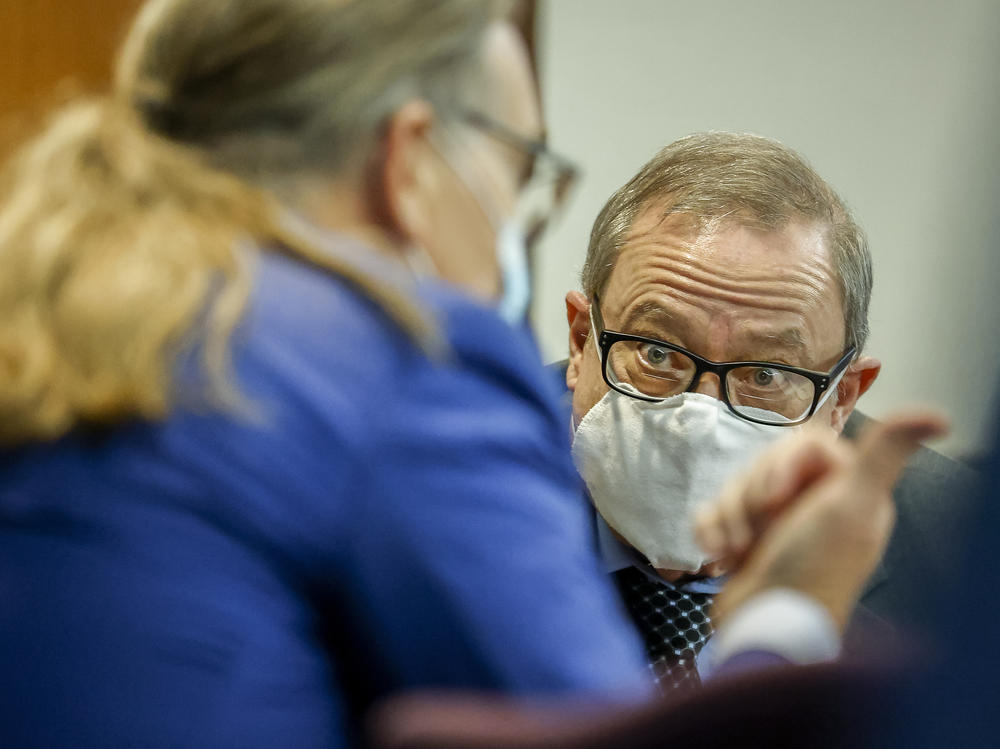Section Branding
Header Content
Defense and prosecutors rest their case in hate crimes trial against Arbery's killers
Primary Content
Over five days in Brunswick, Ga., jurors heard from witnesses called by federal prosecutors: former colleagues and neighbors, forensic experts, law enforcement officers, and even, indirectly, from the three defendants in their own words, through text messages and social media posts read out loud in court.
Only one witness was called by the defense on behalf of Greg McMichael, a woman who testified that McMichael had on one occasion also went to check out a white stranger near the neighborhood; evidence that his vigilantism extended to all, regardless of race.
No witnesses testified for either Travis McMichael or Roddie Bryan.
Closing arguments for both sides will begin on Monday, keeping the multi-racial jury sequestered over the weekend.
To achieve a guilty verdict, the jury must be convinced that the three defendants had racial motive and intent when they chased and killed Ahmaud Arbery on a public street.
"It was precisely Ahmaud's use of the public street that set them off. That boils down to: a Black man running down the street had to be a thief," Bernstein told jurors. "In the eyes of the defendants, vermin."
Travis McMichael, his father, Greg McMichael, and their neighbor, William "Roddie Bryan," were already convicted of murder in a state trial last year, and sentenced to life in prison. But that trial didn't dig into the motive for the murder.
"All three defendants decided, based on the color of Ahmaud's skin, that he had to be in the neighborhood to commit crimes," stated Bernstein. And the evidence and testimony, she said, would prove that, "All three defendants talked behind closed doors about race."
Racist, violent evidence from cell phones, social media, and colleague testimony
Details of ugly, closed-doors conversations about race came out in court, as prosecutors presented dozens of examples taken from the defendants' cell phone records and social media accounts.
The jury was presented with racist memes, text messages, and Facebook posts, including one in which Travis McMichael wished for a semi-automatic rifle, to shoot Black protesters- a sentiment echoed by his father Greg McMichael, who posted that "a gun in hand is worth a whole police force on the phone."
During the confrontation with Arbery, Greg McMichael never called police; he grabbed a gun for the chase, and left his phone behind.
Greg McMichael's phone encryption kept investigators out of his texts, but they were able to access some content via his iCloud account. In one video played for the jury, father and son laugh about trespassing on private property while hunting, joking "there's private property and then there's private property, you know?"
Evidence from the third defendant, Roddie Bryan, was riddled with racial slurs, and prosecutors noted the timing of one series of messages: Bryan had been using the N-word to refer to his daughter's Black boyfriend just four days before killing Arbery, and the day after.
Neighbors and colleagues recount "uncomfortable" interactions with defendants
On the stand, a former Satilla Shores neighbor, Kimberly Jo Ballesteros, recalled an "uncomfortable" and "racist" conversation with Greg McMichael, about a Black renter living on one of McMichael's properties.
"His nickname for her was 'The Walrus,' " Ballesteros recalled.
McMichael, she said, then told her he disconnected the air conditioning in the middle of summer, in order to force the tenant to pay rent.
Another witness, Carol Sears, told jurors about being subjected to a racist tirade by Greg McMichael, triggered by news of civil rights activist Julian Barnes's death.
"All those Blacks are nothing but trouble," Sears recalled McMichael saying. "I wish they would all die."
Two former colleagues of Travis McMichael testified about his time in the Coast Guard and as a contractor at Kings Bay Naval Station. Both jobs, prosecutors pointed out, would have been covered under the military's zero tolerance policy for racism.
McMichael's supervisor at the naval station told the jury he had never had any complaints or problems with McMichael at work. But Kristie Ronquille, who was McMichael's direct report in the Coast Guard, told jurors that McMichael repeatedly "called me an N-word lover" and made other derogatory comments after finding out that Ronquille, who is white, had once dated a Black man.
Law enforcement and expert testimony
Jurors got a close-up demonstration of the pump-action involved in re-loading the shotgun used by Travis McMichael; re-enacted on an unloaded demo weapon standing in for the blood-covered murder weapon.
Georgia Bureau of Investigations firearms expert Brian Leppard explained that with this type of gun, only the first shot could have possibly been accidental; McMichael would have had to reload with a pumping motion in order to get off the three blasts that killed Arbery.
In their cross examination of several witnesses, the defense has tried to portray the Satilla Shores neighborhood as a community on high alert following a spree of local crime. Testimony from Glynn County police officer Robert Rash largely disputed that notion.
Rash, who regularly patrols that area, testified that despite chatter on a neighborhood Facebook group about recent thefts, there were zero burglaries in the year leading up to the murder. And there was only one instance of violent crime, he told the jury: Arbery's murder.
Copyright 2022 NPR. To see more, visit https://www.npr.org.

